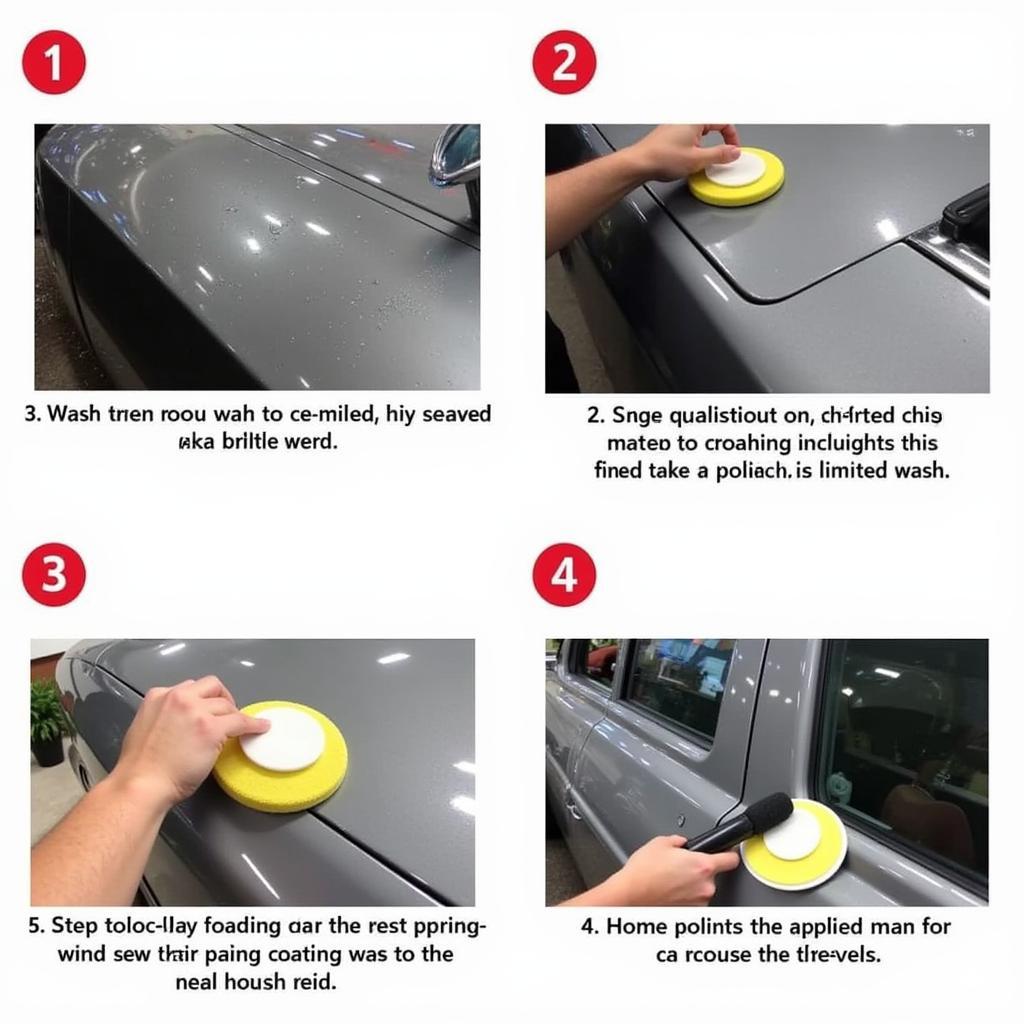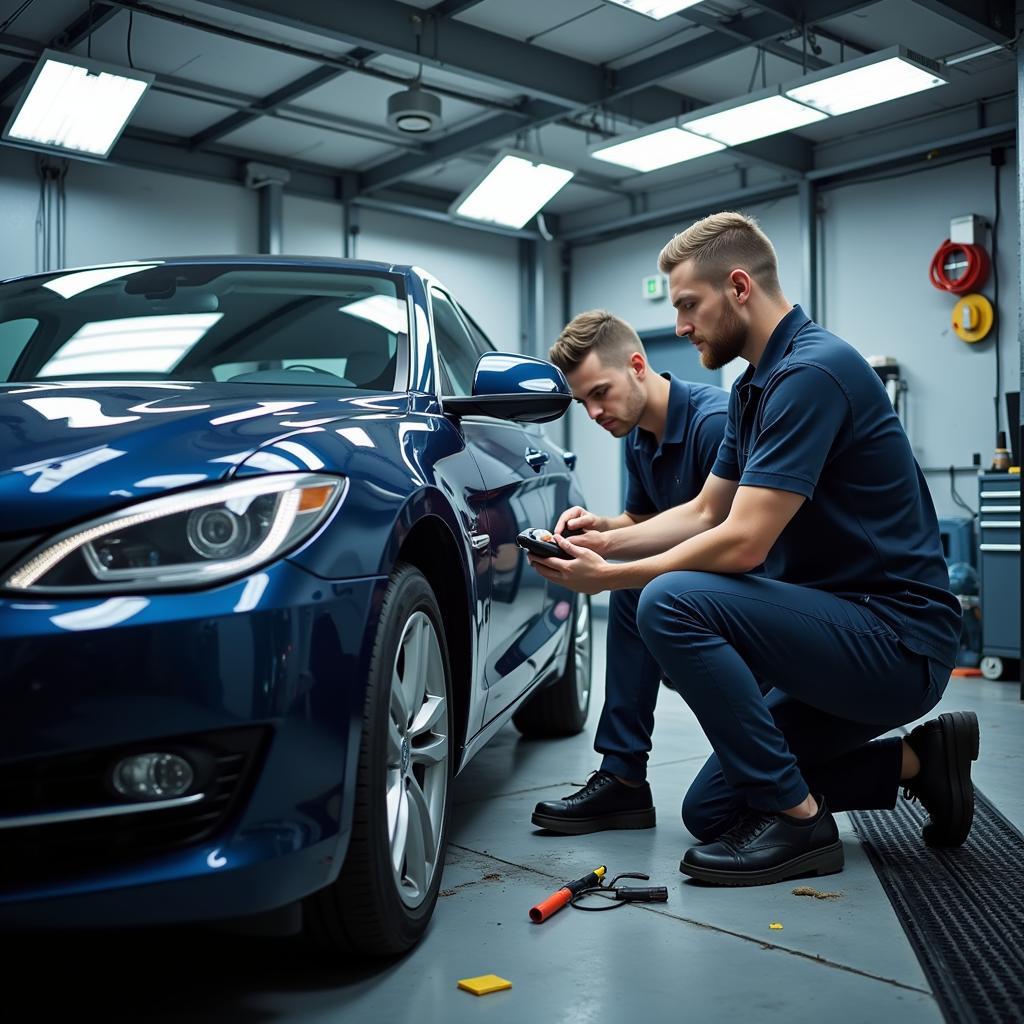
Car Detailing Process Steps
Paint Work Repair Car Detailing is essential for maintaining your vehicle’s appearance and value. From minor scratches to significant damage, understanding the intricacies of paint repair and detailing can save you time and money while ensuring a professional-looking result. This guide will explore the various aspects of paint work repair and car detailing, offering insights into best practices, DIY solutions, and when to seek professional help.
Choosing the right paint repair method depends on the severity of the damage. For light scratches and swirl marks, how to repair scratched top coat on car paint can provide valuable DIY solutions. More serious damage, however, may require professional intervention.
Understanding Paint Work Repair
Paint work repair encompasses a range of techniques aimed at restoring a vehicle’s paint finish to its original condition or enhancing it beyond factory standards. This can involve addressing anything from minor scratches and chips to more extensive damage like dents and rust.
Types of Paint Damage
Different types of damage require different repair approaches. Scratches, the most common type, can range from superficial clear coat damage to deep gouges that expose the underlying metal. Stone chips, often caused by road debris, can chip away paint, leaving small craters. Dents can distort the paint surface and, if left untreated, lead to rust. Oxidation and fading are caused by prolonged sun exposure and environmental factors, dulling the paint’s finish.
DIY vs. Professional Repair
Minor scratches can often be addressed with DIY solutions like touch-up paint or polishing compounds. However, more significant damage, like deep scratches, dents, or rust, typically requires the expertise of a professional. Professionals have access to specialized tools and techniques, ensuring a high-quality, long-lasting repair.
The Art of Car Detailing
Car detailing goes beyond a simple car wash. It’s a meticulous process that involves cleaning, restoring, and protecting every aspect of a vehicle’s exterior and interior.
Paint Correction
Paint correction involves removing imperfections like swirl marks, scratches, and oxidation to restore the paint’s clarity and shine. This process often involves polishing and compounding, requiring specialized tools and knowledge.
Protective Coatings
Protective coatings, like waxes, sealants, and ceramic coatings, add a layer of protection to the paint, shielding it from environmental contaminants, UV rays, and minor scratches.
 Car Detailing Process Steps
Car Detailing Process Steps
When to Seek Professional Help
While some paint repair tasks can be tackled at home, there are instances where professional help is necessary. If the damage is extensive, involving deep scratches, dents, or rust, seeking professional assistance is crucial. Professionals have the expertise and equipment to handle complex repairs, ensuring a seamless and durable finish. If you’re unsure about the extent of the damage or the best course of action, consulting a professional is always recommended.
John Smith, a seasoned auto body technician with over 20 years of experience, emphasizes the importance of professional expertise: “Deep scratches and dents often require specialized tools and techniques that are best left to professionals. Attempting to fix these issues yourself can sometimes exacerbate the problem.”
Finding the Right Professional
When choosing a professional for paint work repair or car detailing, research is key. Look for reputable shops with experienced technicians and positive customer reviews. Ask for quotes from multiple shops and compare their services and pricing.
car detail paint repair near me can help you locate nearby car repair and detailing services. Remember, a high-quality paint job requires meticulous preparation and expertise, so choosing the right professional is crucial for achieving the desired results.
Paint Work Repair and Car Detailing: Key Takeaways
Paint work repair and car detailing are essential for preserving a vehicle’s appearance and value. Understanding the different types of damage and repair options empowers car owners to make informed decisions. black car paint repair and mobil repair car paint offer more specialized information. While DIY solutions can address minor issues, significant damage often requires professional intervention. Choosing the right professional is paramount for achieving a flawless and long-lasting repair. Remember, regular maintenance and preventative measures, like protective coatings, can significantly extend the life and beauty of your car’s paint finish.
 Professional Car Paint Repair
Professional Car Paint Repair
Conclusion
Paint work repair car detailing plays a crucial role in maintaining your car’s appearance and value. By understanding the nuances of paint repair and the art of detailing, you can ensure your vehicle looks its best for years to come. Don’t hesitate to seek professional assistance when needed, as their expertise can make all the difference in achieving a flawless finish.
FAQs
- What is the difference between paint repair and car detailing? Paint repair focuses on fixing damage, while detailing involves cleaning, restoring, and protecting the entire vehicle.
- Can I repair deep scratches myself? While minor scratches can be addressed with DIY solutions, deep scratches often require professional repair.
- How often should I detail my car? Detailing frequency depends on driving conditions and personal preference, but generally, every 3-6 months is recommended.
- What are the benefits of ceramic coatings? Ceramic coatings provide superior protection against environmental contaminants, UV rays, and minor scratches, enhancing the paint’s durability and shine.
- How do I find a reputable car detailer? Look for shops with experienced technicians, positive reviews, and a portfolio of their work.
Need more information on car paint repair in Raleigh? Visit car paint repair raleigh nc.
For any assistance, contact us via WhatsApp: +1(641)206-8880 or Email: [email protected]. Our customer service team is available 24/7.
